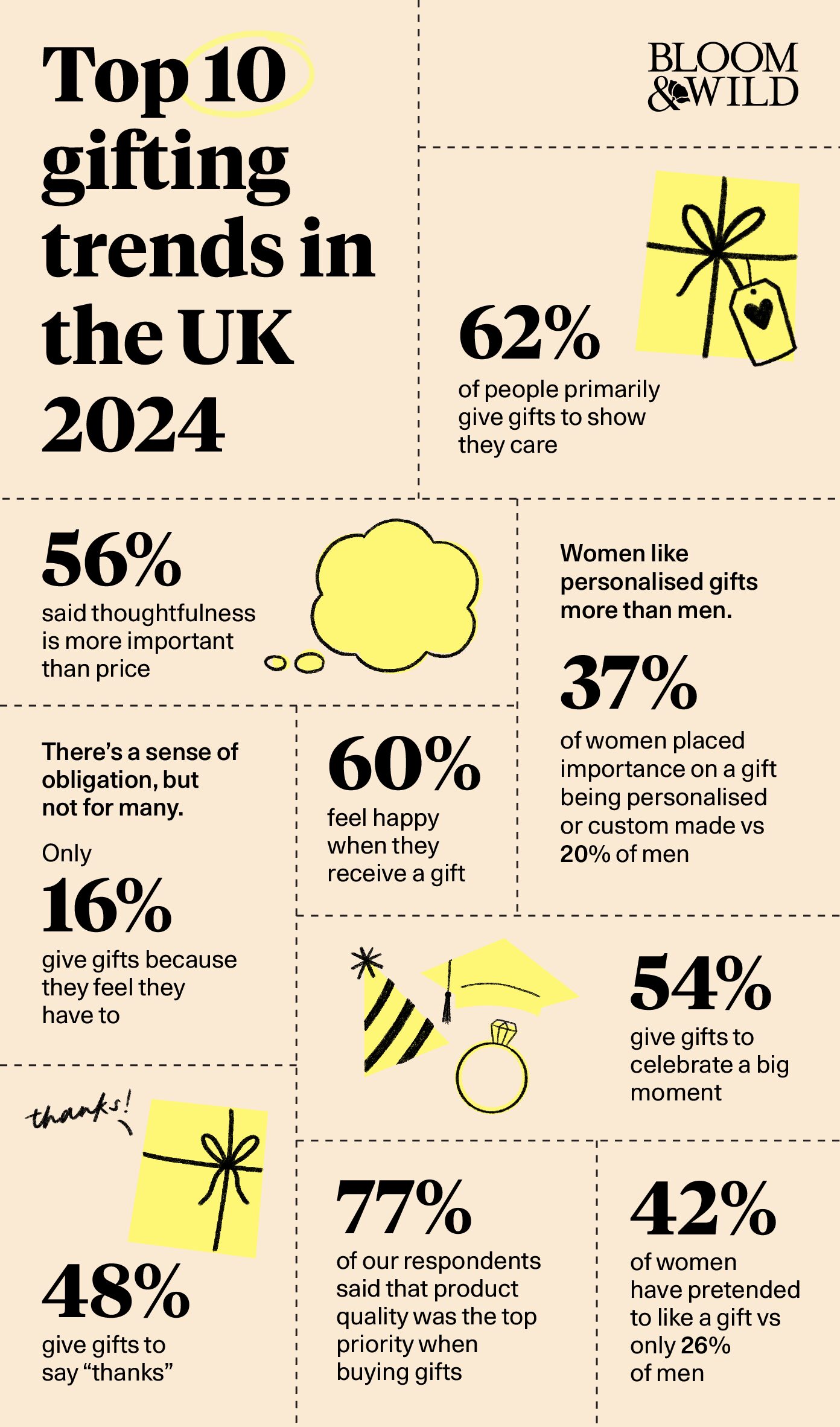Gift-giving, a universal practice that promotes happiness, is something we all look forward to throughout the year. This tradition, which can be traced back thousands of years, is not unique to humans. It’s a behaviour we see in the animal kingdom, from penguins who gift pebbles to their partners to chimpanzees sharing food to reinforce and build social bonds.
The research is clear: gift-giving makes us feel good. But what about if we get it wrong? Do men and women give and receive gifts differently? Which region in the UK looks for the best bargains? And how much are we all planning to spend on Christmas gifts this year?
To answer these questions, online gift and flower specialists Bloom & Wild surveyed 500 people across the UK to understand the latest gift-giving trends. The research indicates that we all approach gift-giving very differently.
When it comes to gift-giving, the UK has different views. People in Wales, for instance, are the most thoughtful, with almost two-thirds saying that they send gifts to show thoughtfulness. On the other hand, this isn’t as big a reason for people in the South East, with just over four in 10 citing this as a reason.
Saying “thanks” with a gift is a big gifting trend in the UK, with 48.11% of those surveyed giving this as a reason. Men are more likely to express gratitude with a gift (51%) vs women (45%).
Looking at the findings on a local level, Londoners are the most likely to send gifts to say thank you to someone. 56.90% of people in London express gratitude with gifts, while those in the South East are the least likely (33.33%).
The research suggests that most people in the UK give gifts to show they care, 61,43% in fact. Interestingly, more women than men highlighted this as a reason. The second most popular reason to give a gift is to express it as a thoughtful gesture, with 54% of women saying they like to send thoughtful gifts, vs. 45% of men. What’s striking is that 56.6% of those surveyed believe that thoughtfulness is more important than price, challenging the common perception that the value of a gift is determined by its cost.
Attitudes towards receiving gifts
Bloom & Wild wanted to understand how people feel when they receive a gift. Their research suggests that most people feel good when they receive a gift, with feelings of being happy, loved, and grateful topping the chart for gift recipients. Just a few of the respondents they spoke to said they felt nervous (4.77%) or embarrassed (8.75%) when receiving a gift.
Interestingly, the research has found that more women than men attach positive emotions to receiving a gift. 63% of women were happy receiving a gift (vs 55% of men), 40% felt “warm” (vs 26% of men), 63% felt “loved” (vs 44% of men), and 61% felt grateful (vs 53% of men).
The UK is known for being polite, but how do we feel when receiving a gift we don’t like? According to the study, politeness trumps honesty, especially for women. 42% of women have pretended to like a present, compared to only 26% of men. It makes sense that 28% of women have given their unwanted gifts to someone else, compared to 17% of men. Let’s hope they changed the name tag first…
The most important factors when selecting a gift
Interestingly, the study found that people in Wales like choice. 62.50% of those in Wales said they look for a diverse and attractive range of products. People in the North West put less emphasis on this, with 41.67% saying they value choice when looking for a gift.
Product quality was the top priority for the respondents, with 76.94% citing this as a reason. Across the UK, those in Scotland were most concerned about quality (82.93%).
Personalised gifts have become increasingly popular in recent years, and the research found that women prefer personalised gifts more than men. 37% of women placed importance on a gift being personalised or custom-made, compared to 20% of men.
In terms of price, people in Yorkshire, London and the North East love a bargain more than most. Of the respondents, 24.14% in London said they value discounts and deals, while those in North East and Yorkshire came in second at 19.64%. Could the cost of living be playing a factor here?
The seasonality of gift-giving
Christmas and birthdays are the most popular occasions to give a gift, followed by Mother’s Day.
The research also highlighted that Christmas is the most stressful time of the year, with 40.16% of respondents highlighting they feel stressed in the lead-up. The festive period is also the most expensive, with 20.28% spending £100-£200 and 18.29% spending over £500. Women (22%) are more likely to spend over £500 than men (14%).
The research also shows that Women give gifts for more occasions than men… except on anniversaries. 56% of women send gifts for Mother’s Day (40% for men) and 85% vs 81% for birthdays. 19% of women send new home gifts vs 9% of men. The only category men were more active within was anniversary, with 43% of men buying gifts to celebrate this milestone vs 40% of women.
Jessica Henderson, Senior Gifting & Lifestyle Category Manager at Bloom & Wild comments on the findings:
“Our recent survey has revealed some fascinating trends in gift-giving. Thoughtfulness remains a key factor, with over half of respondents prioritising sentiment over price. We’ve also noticed interesting patterns in how different demographics approach gifting, from regional preferences to gender differences in personalisation.”
You can find the full study here: https://www.bloomandwild.com/the-blog/gifting-survey-and-trends
Help keep news FREE for our readers
Supporting your local community newspaper/online news outlet is crucial now more than ever. If you believe in independent journalism, then consider making a valuable contribution by making a one-time or monthly donation. We operate in rural areas where providing unbiased news can be challenging. Read More About Supporting The West Wales Chronicle
























